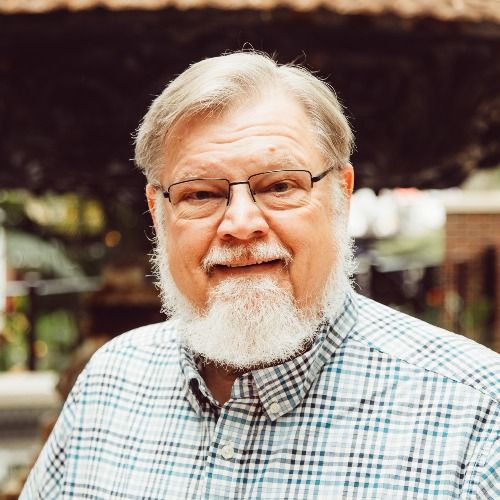Episode 938
Radical Love: The Demands of 1 John 3:11-17
The "Daily Bible Refresh" is presented each day by Rev. Dr. Brad Miller who has a goal of speaking a bit of the bible into two million ears (one million people) in three years (2025-2028).
He is the author of "The A, B, C-1,2,3 Bible Study Guide" Free to you by clicking HERE.
Brad served as a local church pastor for forty years and has a background in radio and podcasting. Moreover, he is a life-long student of The Bible.
He believes in the words of Jesus that “scripture is fulfilled in your hearing” (Luke 4:21)
The "Daily Bible Refresh" is available seven days a week by 6:00 am ET. The episodes are no longer than ten minutes long and are...
- Understandable: A reading from the New Testament (usually the Gospel) selected from the Revised Common Lectionary using "The Message" translation.
- Relatable: You will have a couple of "points to ponder" from the text which will relate to your life
- Applicable: Every episode includes a way you can take action based on the reading
- A recommended resource to help you go deeper in biblical study and spiritual direction.
- A prayer for your day.
A companion resource to the Voice of God Daily Podcast is the “ABC Bible Study Guide” available by clicking HERE.
The "Daily Bible Refresh" is available every day at VoiceofGodDaily.com on Apple Podcasts, Spotify and all major podcast directories.
You can help Dr. Brad attain his goal of getting a bit of the bible into two million ears by subscribing to "Daily Bible Refresh" on Apple Podcasts, leaving a five-star rating, and writing a review. More importantly please share with your network of family and friends about the "Daily Bible Refresh".
Please make listening to the "Daily Bible Refresh" a part of your daily life.
Remember… “All scripture is God-breathed and useful”(2 Timothy 3:16)
The exploration of love as a dynamic force is vividly articulated through the examination of 1 John 3:11-17, which serves as a catalyst for deeper reflection on our communal responsibilities. The speaker underscores the imperative that love must be expressed through tangible actions rather than abstract notions. This scripture starkly delineates the consequences of failing to support one another, drawing a parallel between indifference and the grave act of Cain's violence against Abel. This narrative compels us to confront the reality that withholding support equates to a diminishment of God's love, thereby challenging us to re-evaluate our commitments to those in need in our communities.
Furthermore, the discussion delves into the interplay between systemic violence and the practice of community care. The speaker articulates a radical understanding of love that transcends mere sentimentality, advocating for an active engagement in addressing economic disparities. By illustrating how our choices can either perpetuate or alleviate suffering, we are invited to reflect on our roles within a broader societal context. This exploration encourages a holistic approach to love, one that encompasses both spiritual and material dimensions, compelling us to consider how we can more effectively contribute to the welfare of our neighbors.
In concluding the episode, actionable steps are presented to empower listeners towards embodying the principles discussed. The notion of 'love economics' is introduced, urging individuals to assess their financial priorities and actively support community initiatives. By committing to redirecting a portion of our resources towards aiding others, we can cultivate a practice of mutual support that reflects the very essence of love. This session serves as a clarion call to not only embrace love as an ideal but to enact it through our everyday choices, fostering a community rooted in care and compassion.
Takeaways:
- The podcast emphasizes the profound necessity of transitioning from symbolic love to actionable solidarity within our communities.
- We are encouraged to critically assess our economic practices and their alignment with our commitment to God's love and community care.
- The discussion highlights the importance of mutual aid as a fundamental practice, advocating for resource sharing among equals rather than hierarchical charity.
- A significant point raised is the comparison between passive complicity in systemic violence and the imperative of community support and care.
- Listeners are urged to engage in 'love economics' by auditing their financial contributions to community support and assistance initiatives.
- Ultimately, the episode calls for a radical rethinking of how we express love, advocating for tangible actions that embody our faith in practical ways.
Links referenced in this episode:
Companies mentioned in this episode:
- Voice of God Daily
Transcript
Love in Action the Economics of Community Care A Study of First John 3:11 17 on the Daily Bible Refresh with Dr. Brad Miller hello my good friends, Dr. Brad Miller here with the Daily Bible Refresh your daily visit into the New Testament of the Bible.
Speaker A:From a progressive perspective, we like to make reading of the Bible understandable.
Speaker A:We use the Message version Relatable.
Speaker A:We offer you three relatable points to ponder and applicable in as much as we give you an action step to take.
Speaker A:It's all brought to you by Voice of God Daily that is the home of the ABC 1, 2, 3 Bible study method.
Speaker A: ion years a million people by: Speaker A:Here's our reading for the day from 1st John 3:11 17 Reading from the Message for this is the original message we heard.
Speaker A:We should love each other.
Speaker A:We must not be like Cain, who joined the evil one and then killed his brother.
Speaker A:And why did he kill him?
Speaker A:Because he was deep in the practice of evil while the acts of his brother were righteous.
Speaker A:So don't be surprised, friends, when the world hates you.
Speaker A:This has been going on for a long time.
Speaker A:The way we know we've been transferred from death to life is that we love our brothers and sisters.
Speaker A:Anyone who doesn't love is as good as dead.
Speaker A:Anyone who hates a brother or sister is a murderer.
Speaker A:And you know very well that eternal life and murder don't go together.
Speaker A:This is how we've come to understand and experience love.
Speaker A:Christ sacrificed his life for us.
Speaker A:This is why we ought to live sacrificially for our fellow believers and not just be out for ourselves.
Speaker A:If you see some brother or sister in need and have the means to do something about it, but about it but turn a cold shoulder and do nothing, what happens to God's love?
Speaker A:It disappears and you made it disappear.
Speaker A:Well, my friends, today we're exploring this powerful text that really challenges us to move beyond symbolic love to embodied solidarity and mutual aid.
Speaker A:So in this passage from the Epistle, the Letter from First John, the writer confronts the community with a radical understanding of love, one that demands concrete action and material support.
Speaker A:And this message speaks directly to our current context of inequality and individualism.
Speaker A:Let's get into some points to ponder.
Speaker A:First is going beyond performative love.
Speaker A:The passage here draws a line between withholding material support and making God's love quote disappear.
Speaker A:This challenges our tendency to spiritualize love while ignoring physical needs.
Speaker A:In an era of extreme wealth inequality, how do our spending habits and resources allocation reflect or deny God's divine love?
Speaker A:A second point is about systematic violence versus community care.
Speaker A:The text here compares withholding resources to Cain's murder of Abel.
Speaker A:This suggests that passive participation in systems that deny others their basic needs is a form of violence.
Speaker A:How might this reshape our understanding of loving our neighborhood in a world where economic choices impact distant communities?
Speaker A:A third point is about mutual aid as a sacred practice.
Speaker A:The writer envisions a community where members live sacrificially for each other.
Speaker A:This isn't about charity from above, but mutual support among equals.
Speaker A:How might this model challenge traditional charitable approaches and aspire more equitable forms of resource sharing?
Speaker A:Here's your action step this week.
Speaker A:Practice love economics.
Speaker A:Audit your monthly spending.
Speaker A:Calculate for percentage what percentage goes to aiding other people and community support.
Speaker A:And maybe research local aid groups, food banks, clothes closets and the like.
Speaker A:And commit to redirecting a specific percentage of resources to community care.
Speaker A:Or maybe even join or even perhaps even start some way to aid people in your community.
Speaker A:We'll have a closing prayer here in just a minute, but I did want you to know that we do have a wonderful resource for you called the ABC 123 Bible Study Guide.
Speaker A:You can pick it up at our website voiceofgod daily.com and you can get it free there just for you for your own at home.
Speaker A:Daily Bible Study let's pray.
Speaker A:Oh God, you are divine.
Speaker A:Love and Action when we try to separate faith from finances, remind us that love has material implications.
Speaker A:When we cling to excess while others lack basics, challenge our comfortable compromises, help us move beyond symbolic gestures to genuine sharing of resources.
Speaker A:Make us brave enough to examine our budgets and generous enough to live sacrificially and wise enough to build systems of mutual care.
Speaker A:Transform our economics until they reflect your love intangible life giving ways.
Speaker A:Amen.
Speaker A:Well my good friends, it's always good to be with you here on Daily Bible Refresh.
Speaker A: n years and million people by: Speaker A:You just go to our website voiceofgoddaily.com you scroll to the bottom of the page.
Speaker A:There's a place there to give your gift of any amount which is completely appreciated.
Speaker A:My name is Dr. Brad Miller.
Speaker A:I look to be back to be back with you again tomorrow.
Speaker A:Remember until then that God's loyal love doesn't run out his merciful love hasn't dropped right up.
Speaker A:It's created new every morning.



